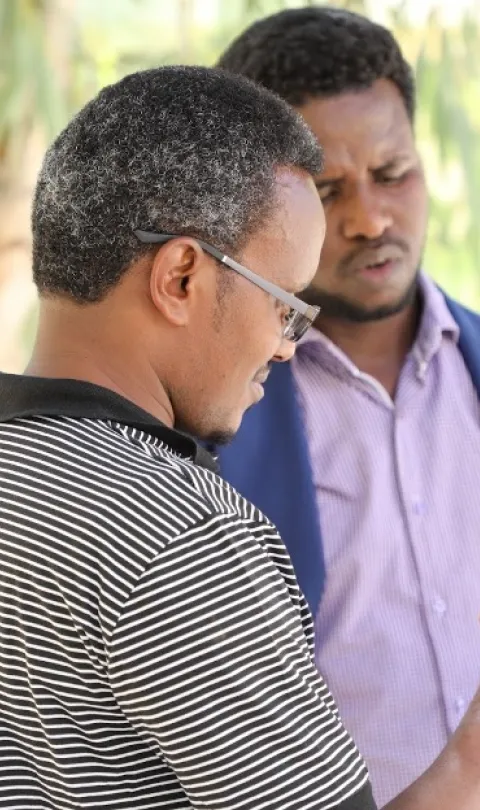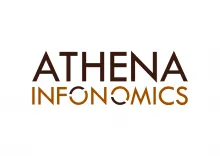Introduction
The past decade of work on the Sustainable Development Goals (SDGs) has shown that increased access to and availability of data does not automatically lead to improved data use or better policy outcomes. While more and better data is a precondition for more effective policy making and service delivery, the relationship between data availability and data use is not linear.
Recently, the data for development community has started analyzing this relationship and questioning what promotes effective and sustained data use in working towards the SDGs. This community includes non-profit agencies, donors, for-profit, and multilateral organizations carrying out projects in participation with governments in low- and middle-income countries (LMICs) to leverage the potential of data and improve delivery of policies and services. These organizations represent key partners for governments and public authorities from LMICs and have a strong influence through data for development projects on data use and governmental practices. It is worth asking whether these stakeholders are aligned when it comes to identifying barriers and incentives for data use and fostering best practices among public authorities.
This Data Values Project policy brief focuses on what it takes to embed data use in data for development initiatives in LMICs. It builds on three focus group discussions, co-organized by the Global Partnership for Sustainable Development Data and Athena Infonomics, targeting donors, multilateral organizations, and civil society/NGOs working closely with governments to improve data use. This brief expands on an earlier discussion paper, and illustrates where stakeholders’ thinking converges and diverges in identifying challenges and drivers for sustained data use. It also offers a set of recommendations for each category of stakeholders to strengthen their impact on sustaining data use in development projects. This policy brief focuses on the views of agencies that partner with governments, with the perspectives of public authorities outside the scope of the focus groups.
Challenges and drivers of sustained data use
Data for development practitioners from the diverse organizations participating in the focus groups were aligned in identifying the biggest challenges to sustained data use within LMICs. They reported that the lack of high quality and reliable data remains one of the biggest obstacles in many countries for governments to use data. They also placed significant emphasis on other challenges that governments face, notably, a lack of:
- Data sharing and data use culture within organizations, leading to limited incentives for changing the status quo.
- Skills and capacity (data literacy) within the public sector to collect, analyze, and interpret data to make decisions.
- Trust in data, underpinned by skepticism driven by poor quality data and a lack of data skills in addition to a disconnect between data producers and data users.
- Suitable infrastructure and tools, including significant issues related to data interoperability, availability of metadata, and user friendly data access systems.
While these barriers are common across LMICs, their weight and significance vary by region. In many low-income countries, lack of data and lack of skills seem to have a bigger influence on limited data use compared to other factors. Likewise, the impact of lack of trust and suitable infrastructure increases as countries move toward middle-income status. This also helps explain regional differences: Experts participating in the focus groups from Asian middle-income countries (India, Nepal, and Pakistan), for instance, insisted more on infrastructural challenges compared to low- and very low-income countries from the sub-saharan African region. Participants from all countries reported facing problems related to data sharing and the lack of data use culture.
While stakeholders from NGOs, multilaterals, and donors agree on what challenges exist to sustained data use in LMICs, there are differences of opinion on how to address root causes.
Participants from civil society organizations and NGOs highlighted that the way in which donors and multilateral organizations work can contribute to limiting the long term impact of development projects as these organizations tend to favor:
- Piecemeal approaches to data projects. Donors and multilateral organizations tend to think in terms of project and Monitoring and Evaluation (M&E) timelines rather than long term engagement with communities, and this prevents sustained data use over time.
- Misalignment between donor and local priorities. Donors are sometimes more interested in final project outcomes than investing in sustainable data production methods.
- Funding new and shiny things instead of building on what already exists. Donors and multilateral organizations are reluctant to invest in platforms, initiatives, or data solutions developed by others even when they work well.
Donors and multilateral organizations recognized some of these challenges embedded in their project management and funding approaches and also pointed to other elements that help explain lack of progress in sustaining data use. Specifically, they pointed to:
(a) lack of skills and capacity to understand and drive data use among local partners and within donor and multilateral organizations themselves.
(b) challenges related to availability of funding for less technical and more people-centric projects
(c) difficulties in coordinating efforts among donors, multilateral organizations and even UN agencies.
Overall, stakeholders acknowledged that the root causes of all these challenges must stem from both the ways that donors and multilateral organizations work and from the relationships between those players and local data ecosystems, including the public sector but also non-governmental and civil society organizations.
Recommendations for the data for development community
To increase sustained data use across countries, the data for development community should rethink the way in which projects are conceived and funded, and focus on building long-term capacity and trust. This translates into several recommendations for specific stakeholders.
Recommendations for donors and development financing institutions
Donors need to adjust their project management and funding strategies to engage on a more long term basis with countries and to connect further with other stakeholders in the data for development ecosystem. In particular, donors should:
- Stop supporting the generation of specific, new datasets and invest in developing sustainable data systems. Donors should stop extracting data from countries for projects, international reporting, and M&E and instead work to strengthen country data production systems for domestic use.
- Support culture change within governments by building capacity and investing in training public sector officials.
- Build capacity and knowledge within their own staff. Donor staff should be further educated on the context of data use within specific countries and bring this contextual understanding to their work and funding approaches.
- Act in a more networked way, connecting communities at different levels and from different sectors, and look at the bigger picture. Knowledge needs to flow between data communities and the international community, and both donors and multilateral organizations should sustain this flow. Additionally, donors need to be able to see the bigger picture and how their funded projects can contribute to the greater goals of promoting sustained data use.
Recommendations for multilateral organizations
Multilateral organizations play a key role in advocating for governments to use data by connecting the dots and the initiatives of different players and developing common principles and approaches around data use. They should:
- Provide technical support to countries for data production without replacing local and national public authorities as data and statistical producers. Multilateral organizations should work hand-in-hand with donors in developing sustainable data systems but should not take it upon themselves to produce datasets on behalf of governments.
- Collaborate closely with donors and NGOs to drive culture change within governments, identifying and working with local change makers.
- Connect the agendas of key stakeholders more closely and build common strategies (i.e. UN integrated strategies covering all UN Agencies) to advocate more effectively for national governments to establish key datasets and integrate data use in public sector practices.
- Work more intentionally with sub-national data systems, strengthening capacity and investing in local infrastructure at the level where many services are delivered to citizens. Countries are not homogenous, and data capacities and data insights should also include sub-national population sets.
- Strength capacity and diversify data related competencies within their own staff, developing a better data culture based on sharing data across departments and agencies and focusing on people rather than technology driven projects.
- Foster the development of data use principles, for instance, around data privacy and data sharing, which could be applicable across countries.
Recommendations for local NGOs and civil society organizations
NGOs and civil society organizations are needed to translate and adapt donor and multilateral organizations approaches’ to local realities and to establish closer links to communities and citizens. They should:
- Focus on connecting data to citizens, overcoming data literacy barriers and investing in creating links to drive greater impact and sustainability. Citizens must understand the value of data and even create a demand for data use for countries to invest and progress in using data.
- Promote better understanding of the case for data use at the national and local levels among key decision makers. This involves advocating for data use at national and local levels and finding local champions to support these efforts.
- Contribute to the development of key data use principles by multilateral organizations and to their translation into local realities.
- Drive greater synergy among civil society organisations and harmonize interventions to engage with local governments and communities and not overload them.
- Engage more with the local media as potential users of data who can influence national data use by stimulating a demand for data and sharing good, evidence-based practices.
Conclusions
The experience gathered in the past few years through data for development projects has contributed a solid understanding of what hinders data use in different contexts. This experience also constitutes the basis for developing better practices in the future.
Acknowledging that data availability does not automatically trigger data use is a first step in the right direction. Yet, to truly improve data use in LMICs, a fundamental shift in investment and approach is required. While this brief suggests a few specific actions for agencies working with governments in LMICs, it is their combined effort which is most likely to drive sustainable change. Donors, multilateral organizations, and NGOs need to push in the same direction for data use to increase among low- and middle-income countries. A shared understanding of the drivers and challenges for data use is essential in joining these efforts.
The Global Partnership and Athena Infonomics sincerely thank all experts who participated in the focus group discussions, sharing their knowledge and input which went into drafting this paper, and particularly the following organizations (in alphabetical order): Africa Voices Foundation, Datalat, GIZ Rwanda, Hewlett Foundation, Kathmandu Living Labs, Iniciativa Latinoamericana de Datos Abiertos - ILDA, International Development Research Centre - IDRC, Islamic Relief Pakistan, Millennium Challenge Corporation (MCC), Omidyar Network, the Asia Foundation, the Open Institute, Open Knowledge Nepal, Sightsavers Cameroon, Twaweza, UNDP Bangladesh, UNDP Lebanon, UNDP, Moldova, UNDP Philippines, UNDP Sri Lanka, UNICEF, UN Women, Women in GIS Kenya, World Bank, World Vision. Thanks to Athena Infonomics staff for their role in shaping, convening, and running this focus group series in partnership with members of the Global Partnership Secretariat.


